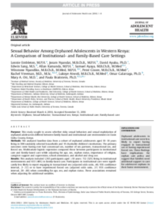The attached study compared the care environments of family-based care and institutional care to determine if care environment contributed to differences in sexual behavior and/or sexual exploitation of orphaned and separated adolescents.
The project followed a number of orphaned and separated children from communities within eight administrative Locations in UG County and includes 300 households, 19 Charitable Children’s Institutions (CCIs), and 100 street-involved children and youth.
Socio-demographics and sexual practices were ascertained through a standardized clinical through data collection processes that occurred on site at CCIs and at the project clinic for household participants. Sexual activity which was self-reported through psychosocial assessment.
The study found that orphaned adolescents' sexual behaviors and risks are influenced by care environment. Living in institutional care appeared to independently protect orphaned adolescents in this setting, especially from sexual exploitation (i.e., exchanging sex, sexual violence), compared to orphaned adolescents living in family-based care.

